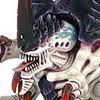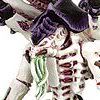|
|
Post by theridon on Aug 13, 2010 5:12:51 GMT
I watched a documentary about this on Discovery few years ago. And I think the guy had some good points, like T-rexes arms being too short in comparison to other predators like Velociraptor. Take what you watch on TV with a grain of salt. Legitimate books/papers are usually far more reliable. Also, secretary birds. Albeit they use wings as shields, all they need to take down their prey is legs and beak. T rex could have been a very capable predator without the need for small arms. Also, I highly doubt trex could have sustained itself traveling from dinosaur carcass to carcass. It's not reliable, and trex was huge, imagine all those calories burning...most vultures are almost purely predators; they are small and have means of traveling rather easily. As for the smelling debate: it isn't only useful for finding corpses; look at some active predators today with great senses of smell, wolves, varanids, bears. And the speed debate-all Trex had to do was outrun its prey. I don't think ceratopsians ran very fast either. Trex also had huge, backwards pointing teeth, most likely to hold onto prey and maim it. Nevertheless, I am sure trex would jump on an opportunity to scavenge a kill. The notion of it being a pure scavenger, however, is hogwosh. Think of it as a giant hyena. Anyway back to the topic, sorry about that. What annoys me is seeing this new idea appear on every internet news source as if the whole scientific community is in agreement with this hypothesis. It's interesting, and it seems actually plausible, but I need more EVIDENCE instead of inferring, as well as scientific peer reviewing before I am convinced.  |
|
|
|
Post by Enigma on Aug 13, 2010 5:52:51 GMT
I watched a documentary about this on Discovery few years ago. And I think the guy had some good points, like T-rexes arms being too short in comparison to other predators like Velociraptor. Take what you watch on TV with a grain of salt. Legitimate books/papers are usually far more reliable. Also, secretary birds. Albeit they use wings as shields, all they need to take down their prey is legs and beak. T rex could have been a very capable predator without the need for small arms. Also, I highly doubt trex could have sustained itself traveling from dinosaur carcass to carcass. It's not reliable, and trex was huge, imagine all those calories burning...most vultures are almost purely predators; they are small and have means of traveling rather easily. As for the smelling debate: it isn't only useful for finding corpses; look at some active predators today with great senses of smell, wolves, varanids, bears. And the speed debate-all Trex had to do was outrun its prey. I don't think ceratopsians ran very fast either. Trex also had huge, backwards pointing teeth, most likely to hold onto prey and maim it. Nevertheless, I am sure trex would jump on an opportunity to scavenge a kill. The notion of it being a pure scavenger, however, is hogwosh. Think of it as a giant hyena. Anyway back to the topic, sorry about that. What annoys me is seeing this new idea appear on every internet news source as if the whole scientific community is in agreement with this hypothesis. It's interesting, and it seems actually plausible, but I need more EVIDENCE instead of inferring, as well as scientific peer reviewing before I am convinced.  I think that it would be a bit more tiring to chase after your prey then to find something that the velociraptors already killed. It would be a simple matter of scaring the little dinosaurs off, something that the T-Rex would be very good at. And Hyenas are actually mostly scavengers, they hunt when they can't find food, or when they can't steal it. |
|
|
|
Post by theridon on Aug 13, 2010 7:09:42 GMT
Take what you watch on TV with a grain of salt. Legitimate books/papers are usually far more reliable. Also, secretary birds. Albeit they use wings as shields, all they need to take down their prey is legs and beak. T rex could have been a very capable predator without the need for small arms. Also, I highly doubt trex could have sustained itself traveling from dinosaur carcass to carcass. It's not reliable, and trex was huge, imagine all those calories burning...most vultures are almost purely predators; they are small and have means of traveling rather easily. As for the smelling debate: it isn't only useful for finding corpses; look at some active predators today with great senses of smell, wolves, varanids, bears. And the speed debate-all Trex had to do was outrun its prey. I don't think ceratopsians ran very fast either. Trex also had huge, backwards pointing teeth, most likely to hold onto prey and maim it. Nevertheless, I am sure trex would jump on an opportunity to scavenge a kill. The notion of it being a pure scavenger, however, is hogwosh. Think of it as a giant hyena. Anyway back to the topic, sorry about that. What annoys me is seeing this new idea appear on every internet news source as if the whole scientific community is in agreement with this hypothesis. It's interesting, and it seems actually plausible, but I need more EVIDENCE instead of inferring, as well as scientific peer reviewing before I am convinced.  I think that it would be a bit more tiring to chase after your prey then to find something that the velociraptors already killed. It would be a simple matter of scaring the little dinosaurs off, something that the T-Rex would be very good at. And Hyenas are actually mostly scavengers, they hunt when they can't find food, or when they can't steal it. Yes, like I said trex would probably jump at a chance to a free meal-but it couldn't have possibly sustained itself if it depended on finding something that had died nearby. By the time trex arrives, a good lot of the meat is gone, and trex must have needed to eat a lot of meat. The scenario just isn't plausible-Indeed trex would have scared off smaller predators, but finding carcasses with enough meat to sustain an adult trex with sufficient regularity would be highly unlikely. A trex taking down a ceratopsian or hadrosaurid means plenty of meat for itself. It might even have saved the remainder for later, just like bears do. Indeed hyenas are largely scavengers, but they are remarkably efficient hunters, and they routinely take down wildebeest and zebra. Also, just a note-there aren't any large animals today that just scavenge, it doesn't seem sustainable. Bears hunt, lions hunt, as do tigers, great white sharks, and even the giant reptiles, crocodiles and komodo dragons. Are they all opportunistic? Certainly. But they can't make a living going around taking the kills of others-they do their fair shair of hunting and killing. Vultures are almost purely scavengers, but they are small and can scan large areas in search of carcasses. |
|
|
|
Post by Enigma on Aug 13, 2010 8:12:18 GMT
Also, the vultures live in desert areas for the most part, if I remember correctly, so they have plenty of expired animals to feed off of. In fact, there are some who eat entirely roadkill now...
I see your point, but I think that overall the T-Rex wasn't as efficient in hunting as a pack of velociraptors, which could be small and fast enough to ambush, they would be small enough to have a fast metabolism, allowing them to chase down and outrun prey, and they could have their fill and then leave before a rex shows up and steals the rest of their food. I think that while it could hunt sometimes, the Rex wouldn't be a very good hunter.
|
|
|
|
Post by Psychodrake on Aug 13, 2010 11:38:27 GMT
I think he would be fine. Most dinosaurs in the late cretacious were big and slow, not to mention the volcanic gas and fumes = more sick dinosaurs. He could probably hunt really well under these conditions, and I imagine he could easily take down any of the dinosaurs around back then in only a very small pursuit. Theropods were built to chase and hunt. Think Rex's arms are pathetic? Look at this guy  |
|
|
|
Post by Enigma on Aug 13, 2010 12:21:49 GMT
It took me around 15 seconds to spot those arms  |
|
|
|
Post by Psychodrake on Aug 13, 2010 12:50:47 GMT
Carnotaur was a hunter iirc, though he was much smaller than T-Rex he still looks quite top heavy. His head is tiny though, he didn't do the crushing thing Rex does but his teeth were serrated and his head was more fragile so it is thought that he just ripped and tore like an Allosaurus but probably with faster blows.
|
|
|
|
Post by wormwood on Aug 13, 2010 14:18:21 GMT
I wonder how many mouthfuls of meat it would take a Tyrannosaur to get through the day?
Thinking about the size of its head relative to its body, It wouldn't need a lot of bites to fill its belly. If it could get close enough to put a bite on a living dinosaur, it'd most likely inflict a mortal wound. Komodo Dragons will bite an animal and let the bacteria from their mouths kill it over time, then sniff out the corpse and eat it. Tyrannosaurus may have had a similar methodology. Their remarkable noses would've aided in tracking the infected wounds of their prey.
|
|
|
|
Post by Psychodrake on Aug 13, 2010 23:10:27 GMT
I heard T-Rex had very good vision too, though some believe otherwise. Guess its always up for debate with extinct animals.
|
|
|
|
Post by theridon on Aug 14, 2010 3:40:30 GMT
Also, the vultures live in desert areas for the most part, if I remember correctly, so they have plenty of expired animals to feed off of. In fact, there are some who eat entirely roadkill now... I see your point, but I think that overall the T-Rex wasn't as efficient in hunting as a pack of velociraptors, which could be small and fast enough to ambush, they would be small enough to have a fast metabolism, allowing them to chase down and outrun prey, and they could have their fill and then leave before a rex shows up and steals the rest of their food. I think that while it could hunt sometimes, the Rex wouldn't be a very good hunter. A desert would probably have even less dead animals, especially since large animals are relatively scarce in deserts. There are plenty of vultures that live near large herds of animals like in africa, and there are more opportunities there. Anyway, the point still stands that vultures have great means of traveling especially as opposed to trex, and they don't have huge stomachs to fill, that's because nothing very large can survive soley on scavenging. I can see how you can view trex as an inefficient predator, but just keep in mind that trex only had to catch up to its prey, which I'm rather confident were slower than trex to some extent. I'm glad wormwood brought up the komodo dragon point-trex could have snuck up on its prey and inflicted a fatal bite-just look at that jaw. I know it doesn't seem likely with a 40 foot giant lizard, but we might be surprised. Bears are incredibly fat, yet they sneak up on people a lot of the time and fatalaties occur. I imagine it could be something like a komodo dragon taking down a water buffalo. It was pretty gruesome but interesting on one documentary, the komodo dragon takes a bite and retreats from the water buffalo and waits for it to succumb to injury. A triceratops, for example, would be similar to a water buffalo I assume-potentially dangerous, but not particularly bright or agile. As I recall dinosaurs were evolving to grow very large in the cretaceous. Tyranosaurids simply grew larger in response to larger prey. Of course trex would scavenge, but I'm still a firm believer that it was a very capable hunter as well. |
|
|
|
Post by Rampage on Aug 14, 2010 6:34:36 GMT
In regards to the original post; My primary instinct is to think Horner is just trying to make a name for himself, but I'll happily sit back and wait for something a little more conclusive to roll along before really getting on board with any one idea. His hypothesis is interesting, but I don't feel it holds enough water.
As for the T-Rex debate; it scavenged AND hunted, like any large predator. Should it chance upon a carcass, wa-hey easy food, but it would have gone about the business of putting that massive jaw to work at killing stuff. The T-Rex evolved a massive head, powerful jaws and huge teeth for a reason - grabbing hold of and killing things quickly.
My money is on ambush specialist - one bite is all it takes.
|
|
|
|
Post by Enigma on Aug 14, 2010 9:13:08 GMT
Yeah, bears sneak up on people. But bears aren't 3 stories tall, and other dinosaurs actually would pay attention to their surroundings if they wanted to live.
I think that the Rex both hunted and scavenged, like a hyena, but also like a hyena, they would prefer scavenging or scaring away other predators as opposed to spending time and energy hunting. That's why they looked so intimidating, that's why the mid-sized dinosaurs armed themselves with awesome flail-tails which could instantly kill or cripple a velociraptor easily but wouldn't do jack against something that big.
|
|
|
|
Post by Rampage on Aug 14, 2010 9:59:11 GMT
...that's why the mid-sized dinosaurs armed themselves with awesome flail-tails which could instantly kill or cripple a velociraptor easily but wouldn't do jack against something that big. Actually... a blow from an Ankylosaurus' tail to the ankle of a T-Rex would be fatal - it would smash the bones to shards and for a bipedal hunter, that means a slow, agonized death. A canny 'Rex could kill an Anky or it's cousins, but it would be an extremely difficult and dangerous task. Ergo, my vote on Rex being an ambush specialist. |
|
|
|
Post by Enigma on Aug 14, 2010 10:22:57 GMT
Or the rex just takes a big bite out of the less dangerous dinosaurs. Or eats them while they're dead.
Group hunting would be more effective against Ankylosaurus now that I think of it... I don't think velociraptors would be scared off if one of them got destroyed, and with that many it would be easy to surround the other dino.
|
|
|
|
Post by salamut2202 on Aug 14, 2010 11:26:34 GMT
also the underbelly had soft spots and many raptors were around the size of a turkey. he he.
|
|












